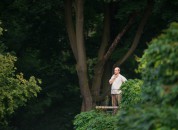
We present to you the interview with Lawon Barszczeuski ‒ this year’s holder of the scholarship of the City of Krakow as part of the International Cities of Refuge Network (ICORN) programme. The aim of the Network is to protect and promote freedom of speech and to create an international platform of solidarity and cooperation. During 9 years of its activity, ICORN found temporary refuge for several hundred writers, intellectuals, and bloggers.
Since 2011, Krakow has hosted three writers as part of the residency programmes: Maria Amelie ‒ nee Madina Salamova (North Ossetia / now in Norway), Kareem Amer (Egypt / now in Norway), and Mostafa Zamani (Iran). In 2014, the residency stay as part of the ICORN network was awarded to Lawon Barszczeuski, a Belarusian writer, poet, translator, and human rights activist. The interview was conducted by Małgorzata Nocuń.
Lawon Barszczeuski (1958) ‒ Belarusian writer, philologist, translator, poet, and politician. He translates from Latin, ancient Greek, German, English, French, and Polish (including the works of Johann W. Goethe, Bertold Brecht, Franz Kafka, Stanisław Wyspiański, Bruno Schulz, Czesław Miłosz, and Sławomir Mrożek). In the years 2003-2005, he was the chairman of the Belarusian PEN Club. Author of four books and co-author of more than twenty, he wrote prefaces to several publications and translated literary works and historical treatises of more than forty authors into Belarusian. He was arrested and imprisoned several times for his political and literary activity. In 2014, he received the scholarship of the City of Krakow as part of the International Cities of Refuge Network (ICORN).
Małgorzata Nocuń – is an editor of the “Nowa Europa Wschodnia” bimonthly and a reporter for “Tygodnik Powszechny”. She specialises in the subject matter of Eastern Europe. Co-author (with Andrzej Brzezicki) of the following books: “Białoruś. Kartofle i dżinsy” (“Belarus. Potatoes and Jeans”; Krakow, 2006), “Ograbiony naród. Rozmowy z intelektualistami białoruskimi” (“The Robbed Nation. Conversations with Belarusian Intellectuals”; Wrocław, 2007), and “Łukaszenka. Niedoszły car Rosji” (“Lukashenko. The Would-Be Tsar of Russia”; Krakow, 2014).




